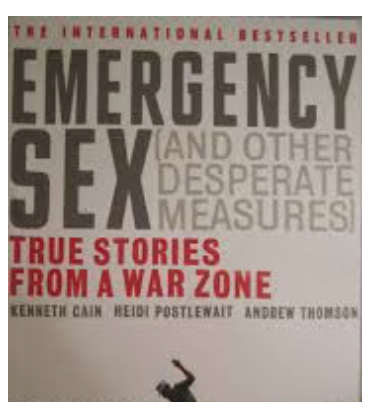Emergency Sex: applying the concept of the moral career
According to Erving Goffman, we all manage our identity moment to moment but, and here’s the twist, be says that “The social situations we find ourselves in do not so much support the self, but constitute it.” His statement provides support for -and is supported by- the work of Zimbardo and Milgram, stressing the point that how we behave has much to do with context. Indeed, that is the classic defense attorney’s argument, as seen in the court martial of Lt. William Calley for his part in the My Lai Massacre.
Goffman defines and makes use of the concept of moral career in his book Asylums, and I used his idea to probe into the lives of aid workers in Aid Worker Voices (and also, in another lifetime, here in Self Identity of the Female Prisoners: the Moral Career of the Inmate). In our conversation with Mahmoud (‘Moody’) we observed that he had changed -and continues to change- in terms of who he is as he becomes older and more experienced, making an application of the moral career concept.
In Emergency Sex we meet and get to know three very different people who chanced to become life-long friends, each telling their own stories.
Which of the three -Kenneth Cain, Heidi Postlewait, and Andrew Thomson- seems to have been more  changed by their experiences by the end of the book? Which would you like to meet in person, and what questions would you ask them? Who was the most complicated? How did the circumstances in which they found themselves bring out different behaviors?
changed by their experiences by the end of the book? Which would you like to meet in person, and what questions would you ask them? Who was the most complicated? How did the circumstances in which they found themselves bring out different behaviors?
Most importantly, how can you use the concept of moral career as you describe their journeys? How do their race, class, and gender impact their journey?
For this post address any of the questions above, but then choose one of the three main characters -Andrew, Heidi, or Ken- and map out their moral career using specific examples from the book (cite page number), illustrating how they transitioned from one stage of their moral career to the next. With an emphasis on the very last chapters, explain where they ended up in terms of their sense of self. Keep in mind the moral career idea presented in “Missionary, Mercenary, Mystic, Misfit”. If you do deviate from the MMMM model, explain why, labeling your own stages. Make explicate use of the insights of Goffman (et al) to support your characterization of their moral career.
Rubric:
- Due by class time Monday, March 11th.
- Late posts will be downgraded at least one letter grade.
- Comments to at least three colleague’s posts by March 12th by 10:00PM EST.
- At least three citations: at least one from text and/or other assigned reading, and at least two from outside academic sources. Note: you are to read/watch/listen to all of the material in the hyperlinks in the parent post above; your contact with the material should be apparent in your post.
- List references at the bottom of the page (MLA format).
- At least one photo and/or video link.
- Minimum 0f 500 words (excluding references).
- Grade will be based on quality and quantity of response to the post prompt including adherence to the above benchmarks.
- Keep in mind that you are writing for a broad audience that is educated and interested in this topic; infuse your post with the sociology you are learning/have learned in a non-jargonistic manner
As a shorthand for the longer, more detailed grading rubric above this SOC summary may be useful.
- S = demonstration of understanding and application of sociological concepts, theories, etc. germane to the topic, especially those taking about in the text and in class
- O = organization and structure overall; flow of ideas, appropriate and contextualized use of images and videos, proper documentation of sources
- C = analytical creativity; going beyond obvious restatement or simple examples and pushing boundaries of thought and perspective; finding outside academic sources beyond the obvious
Please check Assignments/Assignment 6 before you Publish.
